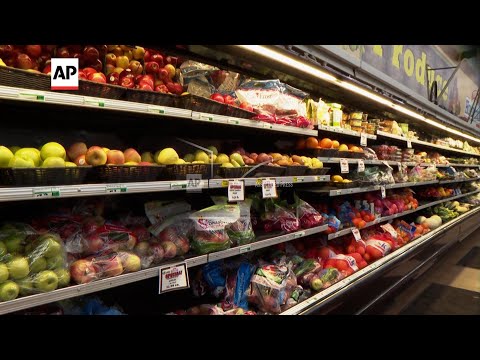(4 Apr 2025)
RESTRICTION SUMMARY:
ASSOCIATED PRESS
New York – 4 April 2025
++SOUNDBITE PARTIALLY COVERED++
1. SOUNDBITE (English) Cora Lewis, The Associated Press:
"President (Donald) Trump unveiled his latest round of tariffs, affecting dozens of countries and reaching as much as 50%. But where will you feel the effects first? Experts say on the grocery aisle on goods like sugar and coffee. A lot of the targeted countries also produce clothing and textiles, so costs could increase there as much 17%. Trump has said that he wants to revitalize American manufacturing, but because the tariffs are so uncertain, a lot of companies are unlikely to put the investment in necessary to create new factories or facilities, if they’re not sure they’ll see a return on that investment. Economists also say the effects of these tariffs won’t be felt equally. Lower-income households spend more of their income on goods rather than services and have less savings to draw upon. Experts say don’t panic buy, but do reevaluate your budget and make substitutions where it makes sense for you."
ASSOCIATED PRESS
Washington – 3 April 2025
2. Pan of a chart displaying ‘reciprocal’ tariff rates
ASSOCIATED PRESS
Rowland Heights, California – 3 April 2025
3. STILL of a shopping cart filled with groceries in an aisle at a grocery store
ASSOCIATED PRESS
ARCHIVE: Punxsutawney, Pennsylvania – 2 February 2025
4. Various of shoppers in a grocery store
ASSOCIATED PRESS
Los Angeles – 3 April 2025
5. STILL of a hand-embroidery dress fabric being sold at a fabric store in the Fashion District
ASSOCIATED PRESS
Frisco, Texas – 2 April 2025
6. Various of a grocery store
ASSOCIATED PRESS
ARCHIVE: Punxsutawney, Pennsylvania – 2 February 2025
7. Pan of fruits and vegetables sold in a grocery store
8. Close of bananas for sale
STORYLINE:
President Donald Trump has unveiled his latest tariffs, and they could have significant implications for your wallet.
Trump’s sweeping new tariffs, on top of previous levies and retaliation worldwide, are expected to increase prices for everyday items.
The trade wars have already roiled financial markets and plunged businesses into uncertainty — all while economists warn of potentially weakened economic growth and heightened inequality.
Tariffs are taxes on goods imported from other countries. Companies buying foreign products pay the tariffs imposed on them — and, as a result, face higher costs that are typically passed on to customers.
Trump has argued tariffs will protect U.S. industries from unfair foreign competition and raise money for the federal government. But since so much of what we buy today relies on a global supply chain, steeper tariffs mean you’ll likely see more expensive prices from the grocery aisle to your next car repair.
Will the tariffs affect everyone equally? No. Experts warn that these tariffs could escalate inequities.
Low-income families in particular will feel the costs of key necessities, like food and energy, rise with fewer savings to draw on — significantly straining budgets.
Beyond more immediate price pressures, experts also warn that tariffs could contribute to unemployment or lower incomes down the road.
Trump has argued that tariffs will bring manufacturing back to the U.S., but if businesses take profit hits or change their supply sources, there could be layoffs worldwide.
Which consumer goods will be affected? Fruits and vegetables, your next phone purchase, a pharmacy order, new clothes, or a trip to a mechanic who uses auto parts made outside of the U.S. could all be impacted.
Find out more about AP Archive: http://www.aparchive.com/HowWeWork
Twitter: https://twitter.com/AP_Archive
Facebook: https://www.facebook.com/APArchives
Instagram: https://www.instagram.com/APNews/
You can license this story through AP Archive: http://www.aparchive.com/metadata/youtube/88a294a89865411f9167c03e403cdd82
Author: AP Archive
Go to Source
News post in April 9, 2025, 9:05 pm.
Visit Our Sponsor’s:
News Post In – News





